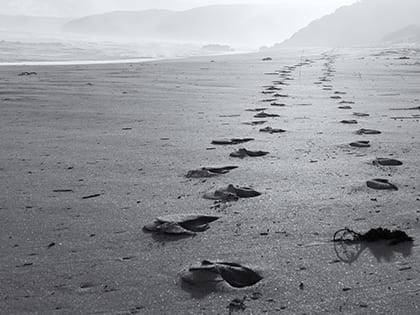The disciples have me thinking. “What’s the link between what we rationally think and what we choose to love then?” I ask.
“Well, even though it moves obstacles, it’s not the gospel’s rationality that wins or keeps people,” Clark says, “The power is in the beauty of it. Apologetics removes obstacles to experiencing that beauty. But in the end, it’s not just what convinces us, but what attracts us. Thomas Chalmers preached on this in his famous sermon, ‘The Expulsive Power of a New Affection.’ You can never just eliminate an idol in someone’s life. You have to replace it with something that they love more.”
He’s getting excited at this point, talking fast. “Business research bears this out,” he says. “Especially today. This generation of millennials doesn’t care much about earning more money. They have to be working in organizations that they are passionate about, that align with their values. Faith is like that for this generation too. The only reason any of us change our life or belief is because we’re given something better. Our idol—whatever it is—becomes replaced by the true God. A pastoral apologetic moves people toward love. It’s why good apologists like Lewis, the rational romantic, truly come to life when Christians get both the mind and heart. We need to get people not only to think about God, but also move their love and allegiance to him. We need to present Jesus and the gospel as amazing, not only as truthful but as hopeful, valuable, pleasurable and meaningful.”
“That sounds like a two-handed apologetic,” I say. “We have a responsibility to confront propositional obstacles with one hand, then with the other we offer something better: helping people treasure Jesus. Like clearing a garden of weeds so you can plant it.”
“Absolutely,” Clark says. “And in the end, in terms of our human motivation, it’s about us. We’re asking about ‘the problem of God,’ but really asking what any of it will do for me. It’s not about cold data; it’s about how we live. Whether life makes sense. Whether we experience meaning. Why are we interested in any of this? Because we wonder where we fit into it all. “How will this impact my life for good or ill?” we ask.
As we hang up, I wonder if what Clark just said is actually just another way of asking if our philosophy makes us happy, and for a moment I can hear the old man’s footsteps sloughing through sand, catching up with Justin.
Deepening the Questions
Perhaps Christianity is that old man. Perhaps our questioning culture is Justin, annoyed that someone is following him around and turning to stare us down, ready for an argument.
Perhaps that, with Clark’s winsome wisdom and the heritage of Christian reason, is the image of pastor-as-apologist that we need—simply following those around us, as people in love with the God of both philosophers and prophets.
Ready with an answer, sure, but also ready with many more questions. Ready to deepen, not gloss over the search for truth and meaning in human life that every single person shares as a birthright of our race. Ready to name the question behind those questions, the search behind that search. Ready to ask, with a light in our eye, the shadowy face of Jesus haunting our brain, and just the hint of a smile (for we know we are planting a gentle splinter in a neighbor’s mind):
“How’s your philosophy working out for you?”
Paul J. Pastor is editor-at-large of Outreach. His most recent book is The Listening Day: Meditations on the Way (Volume Two). He lives in Oregon.

